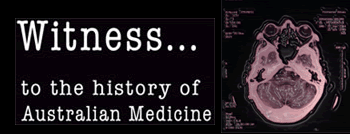


A chapter in the evolution of paediatrics in Australia
Introduction
Participants
Origins of the Department
Early developments
Leadership
New directions in patient care, research and teaching
Ethical issues in research and treatment
Formalising the research effort
Training Programs
Surgical research and training
Finding funds for research
Establishing sub-specialty departments
More on medical education
Academic outreach
Endnotes
Index
Search
Help
Contact us

Kester Brown: Can I talk about education for a minute. I was involved in the '70s in a very interesting educational activity in the Casualty Department when John Hurst was in charge.[124] He organized that I and a pharmacist would go down and talk to the residents about the common drugs they used. The question of taste came up, and also toxicology aspects. But the fascinating thing about it was that, during those sessions, the transfer from using aspirin to using paracetamol occurred. During one rotation, the whole switch occurred. It wasn't from an outside source, it was from inside the hospital.
Glenn Bowes: To come back to a point Jim raised, under [David] Penington as Vice-Chancellor of the University,[125] student assessment became codified, so that became part of the whole University ethic. And John Hutson's teaching in the Department of Paediatrics has been rated among the highest by students over more than a decade, and continues to this day as one of the most highly rated and appreciated student teaching sessions in the Medical Faculty.
Ann Westmore: I'd like to pick up on a point about career paths for paediatricians in the University Department of Paediatrics. What happens when you have an exceptionally good teacher among the surgical or medical staff? Is that talent made use of and rewarded?
Peter Phelan: The first point here is that there are many advantages in having a mixture of Visiting Medical Officers and full-time staff as teachers as they bring somewhat different perspectives to the students.
Second, not all doctors are intrinsically good teachers. Train the trainer sessions are very clearly necessary as I have learnt since becoming more involved in postgraduate training.
The third point is that we do not provide enough acknowledgment for our best teachers. Many overseas universities have annual awards for the best teacher, we don't in general in this country. We get student assessments back. I used to tell people who were very good, but had difficulty telling those who were bad.
Glenn Bowes: To pick up on the comments of Max and Jim. The University Department now has a half time lecturer, Jenny Gough, who has an education background.[126] She teaches a range of people including training Registrars in how to teach and supervise Residents in group or one-on-one teaching. In the new course, Jenny has been the backup to Michael Marks, a senior lecturer who is full-time, and gives the tutors introductory material, sits in on tutorials and gives feedback.[127] It [the teaching program] has predominantly been focused on the Registrars and Fellows but we are working through the more senior staff.
This is something that's two or three years old, she started doing that half-time when the medical education officers were appointed in the hospitals. The other half of her time is as an academic continuing lecturer in the department. So, it might have been a long time coming, and it certainly has a way to go, but that is the direction itís been taking.
Kester Brown: One aspect of assessment. I remember when we got anaesthetic registrars to talk about their view of their training, one of the views from a senior fellow was, "Nobody ever told me how I was going". It's vitally important to tell people if theyíre doing very well, theyíre doing OK, or if theyíre weak the problems that should be addressed.
Garry Warne: During Peter Smith's time, the Master of Medicine course for overseas postgraduates was revamped. The Department of Paediatrics did a terrific job in getting an orientation about basic things to do with coming from a non-English speaking background, such as that people who were accepted had a good grasp of English. RCH International had also been advocating for language testing for potential postgraduate students. This is now policy throughout the Hospital.
Don Kinsey: I know the seminar is drawing to a close, but there is one quick matter of semantics. We've heard about benevolent dictators. I donít believe thatís a true description of these great leaders weíve been talking about. Dictatorship means you are putting somebody down but leadership means you are encouraging and leading them along. And I would rather say my mate on my right [Peter Phelan] was a great leader, not necessarily a dictator. Iím just making that point for posterity.
Glenn Bowes: I think it's been a terrifically generous thing for you all to do today, to share your experience, thoughts and wisdom. Iíve been thinking all day what joy itís going to be to share the product, these stories and the important themes - the origins of the Department and its influence on the environment today and on paediatrics at the Childrenís, and our training programs. We will be considering what steps we can take beyond this, to continue to develop the history of paediatrics. So thank you all for coming.
 |
Witness to the History of Australian Medicine |  |
© The University of Melbourne 2005-16
Published by eScholarship Research Centre, using the Web Academic Resource Publisher
http://witness.esrc.unimelb.edu.au/034.html